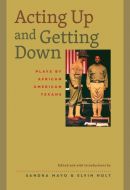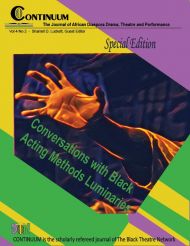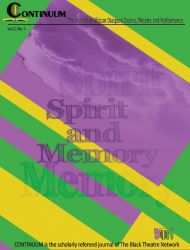 Acting Up and Getting Down: Plays by African-American Texans. Edited by Sandra Mayo and Elvin Holt.
Acting Up and Getting Down: Plays by African-American Texans. Edited by Sandra Mayo and Elvin Holt.
Austin: University of Texas Press, 2014;340 pp. $36.85 cloth, $16.72 paper.
The landscape of the theatrical universe is broad and populated with many worlds, each as distinct as the characters and aesthetics that inhabit them. But not unlike the real universe, it is always in flux, ever ebbing. Entire movements are born and extinguished as fast as the last curtain call. In the cosmos of mainstream theatre there is little room for theatrical outliers. Mainstream theatre tends to lean toward its favorites: David Mamet, Arthur Miller, and those newly emerging voices from old spawning grounds.
Voices orbiting outside the sphere of popular familiarity are, however, just as important to the lifeblood of American theatre as the old standbys. They are born out of the cultural pluralism and growing pains of a rich and often brutal national history, a history often forgotten or erased in a whitewash of commercialism. These theatre outliers populate worlds of unfamiliar perspectives. They’re imports from far-flung regions of the country. They represent the best and worst of it: minority theatre, community theatre, the raw kind of theatre one encounters at a reading at the local public library or in the basement of some neighborhood church. This theatre exists on the very edge of the map, literally. On rare occasions the voices of the outliers slip out of the dim nebulousness and find their way to New York or London’s West End.
However, even this time spent outside of the orbit of obscurity is short lived. These plays almost always revolve back to the places of their conception, where their souls are informed by an almost spiritual aestheticism injected with the air, sounds, and collective heartbeat of the communities that bore the artists who penned them. The drawback is that, invariably, these plays fall out of reach, and unless you're looking for them, that is where they stay.
Luckily, there are a few devoted souls who have dedicated entire tracts of their lives to collecting these often forgotten and overlooked gems of our theatrical heritage. The idea behind any anthology is that the collected works are the best representations of their particular form, that they will provide readers with just enough to illuminate their understanding and perhaps whet their appetites. The editor’s mission is to condense in a few choice pieces the best examples of literature or music—or plays—so that the person on the receiving end gets, for lack of a better term, the existential gist of the thing. This is the hope, anyway.
Although Acting Up and Getting Down: Plays by African American Texans by Sandra M. Mayo and Elvin Holt is not the final authority on plays by African American Texans, it is at the very least a good start. This anthology is an admirable collection of one-act and two-act histories, domestic dramas, and fables by some of Texas's preeminent albeit under-celebrated voices in
Black theatre—in American theatre.
Those knowledgeable of African American theatre are familiar with the likes of August Wilson, Lorraine Hansberry, and Suzan Lori-Parks. Acting Up and Getting Down introduces or re-introduces us to others in the canon of Black theatre such as Celeste Bedford Walker, Sterling Houston, and Ted Shine, who in their own right are just as formidable with the pen. This is one of the anthology's successes, in that it exposes us to artists who might have otherwise gone or become unknown. It goes further in its identification of its selection of Black Texan playwrights to attempt to define them— a"challenge," the editors admit. They include playwrights who were born in Texas and others who spent a considerable amount of their lives there, thereby offering readers a truly authentic Texas experience.
Acting Up and Getting Down also succeeds in its aim of capturing the regional essence of Black Texas. One has the sense of being transported to Houston or East Texas. We are exposed to the rich vernaculars and traditions of a very distinctive cultural set. Not unlike their contemporaries in Chicago, Detroit, and Harlem, these playwrights have captured the wider context of the Black experience in America, albeit with a Texas twang. Each of the plays addresses various points in the history of the Black experience in America, whether directly or contextually. The playwrights selected have woven stories that are steeped in the ills and glories of what it means, not only to be Black in America, but what it means to be a Black Texan living in America. In this sense they are more than plays; they are moments pinched out of time, out of a profoundly tumultuous, though no less glorious, human experience. These moments transport and inform us.
For all the admirable qualities of Acting Up and Getting Down, it is unavoidably limited in its scope. The seven plays represented in this anthology just manage to scratch the surface of the African American Texas theatre and maybe that's the point. It shows us to the door. It's up to us to walk through it, and perhaps upon doing so, encounter an entirely new universe.
Cory A. Stephens
Screenwriter, playwright, producer
Founder, RebelYard Theatre Collective



